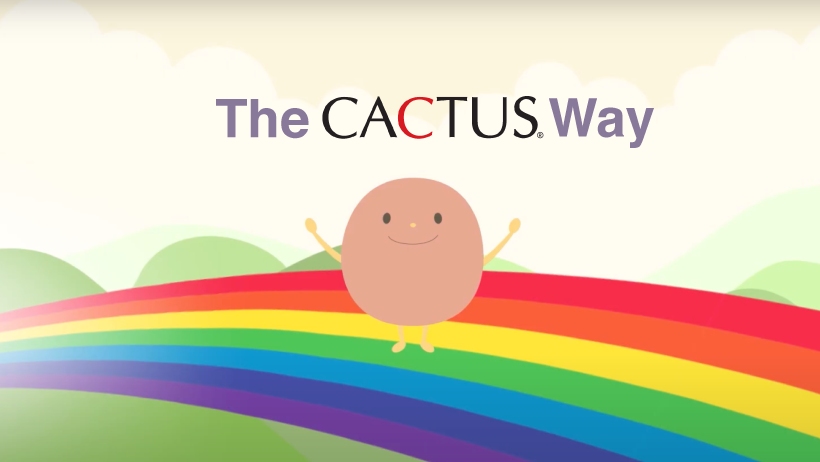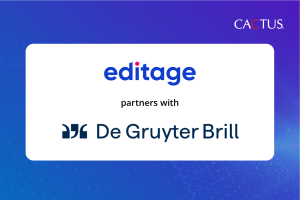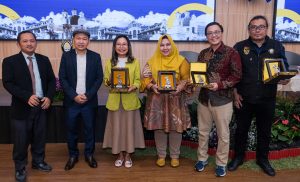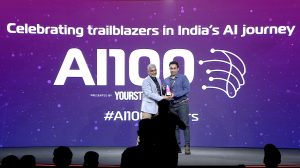The CACTUS Way #5: Be conscious and self-aware. Take charge of your emotions.
I’ve had migraine attacks for as long as I can remember. But they got progressively worse between 2011 and 2014.
Part of me knew what was triggering the attacks. These three years were the darkest period of my life. My self-esteem was at its lowest and insecurity at its peak. I felt demotivated, ineffective, underconfident, and like I was sinking to the bottom of the sea. The company was going through many changes and it was an emotional rollercoaster for me. But this was also the period I learned a lot about myself and grew tremendously.
At the end of 2011, after I moved back to Mumbai from Tokyo (where I had spent about 3 years expanding our business in Japan), I took over the Customer Service team at Editage. It was clear to me that the customer was integral to our business. But our service communication was largely transactional. I wanted to revolutionize the way we interacted with customers and raise the bar in delighting customers. The team was restructured, and we had many workshops and discussions with them, culminating with us rechristening the team Customer Delight Department and changing my title to Customer Happiness Officer to indicate a renewed focus on the customer. The team was sold on the vision and was ready to experiment. But we were short on resources and every day was spent firefighting. Many good ideas had to be abandoned because they were too complex to execute. I blamed everyone and everything around me for this failure, but also took it as a deep personal failure! Little did I know that things were going to get even more challenging.
Around the time, CACTUS was aggressively entering new markets. We had established localized sales models for each market, but we needed some functions to be centralized at the headquarters in India. I had taken charge of forming these functions—R&D, thought leadership, and branding being some of them—which would be responsible for our global strategy. We had some fantastic ideas but were always struggling to get them done as we were on the fringes and anything we came up with meant work for others who already had their plates full. It was difficult to get the longer-term ideas prioritized over the short-term business goals. Eventually, most of the teams I helped build were disbanded and the resources were moved to other areas. This, again, to me was my failure because something I had started was abandoned. I also blamed others for not being able to look ahead into the future.
On the one hand, I was struggling to scale the impact of the functions I was supposed to be driving; on the other, our growth strategy required me to take on newer responsibilities like leading the technology and delivery operations of Editage. I had come to believe through my recent experiences and the stories I told myself that I am good with ideas but not with execution. I had started to lose confidence in myself and felt undeserving, and like an imposter who didn’t deserve to be where I was. I felt that everyone—my core team, Anurag, the rest of CACTUS—was judging me. I constantly felt angry with everyone and everything around me.
I found myself wondering why I was even doing this—I wanted to run away from all of it and lead a life where I didn’t have to struggle so much and wasn’t judged all the time. While I was going through this downward spiral, Anurag recommended that we do a business
coaching program together. I initially refused. I felt he thought I was not capable and needed help; I felt I didn’t need help. But he insisted that we meet the coach. I relented. And I’m so glad I did.
“Why are you so harsh with yourself?” the coach asked me during one of our talks after he heard me patiently. “Take responsibility for yourself,” he told me. “It is time to get out of this phase of self-pity and understand your situation to evolve.” With the coach guiding me through a process of self-discovery, I realized how I had gone from blaming people and situations around me to blaming myself. I was stuck in a cycle of negative self-talk and self-criticism and constantly compared myself with others. All the notions I had about being judged stemmed from my own insecurities that I was projecting on to others.
On the coach’s recommendation, I started maintaining an incident diary to improve my self-awareness. I wrote down my feelings every day and observed how I reacted to situations without trying to justify the way I reacted. I started being more conscious and aware of my emotions through daily meditation and affirmations.
These measures helped me take charge of my emotions and come out of this cycle of self-doubt. This journey was instrumental in helping me feel better about myself, take on greater responsibilities at CACTUS, and positively shape my relationships. I have learnt that your mind and emotions trick you and trap you in a vicious circle of denial, escape, rejection, justification, and aggression. Emotional reactions stem from your memories and experiences. Being more self-aware and conscious about my thoughts, emotions, and actions is key to self-realization.
When things aren’t going your way, it’s easy to place blame squarely on someone else, or if you are like me, on yourself. Neither is helpful. In fact, they will push you down a negative spiral of avoidance, judgement, and anger with others or with yourself.
Even today, managing my emotions consciously is a daily responsibility. And I have not had to take a day off due to migraines in almost 5 years now!
This writeup is part of a series called The CACTUS Way Leader Stories. The CACTUS Way is what we collectively call our 8 guiding principles. We asked the senior cadre at CACTUS to share personal experiences where they practiced or identified with these guiding principles. These stories of struggle and reinvention, despair and hope, conflict and collaboration, and self-doubt and self-discovery make for an interesting read.
Learn more about The CACTUS Way here: https://cactusglobal.com/about-us/culture-and-values/









